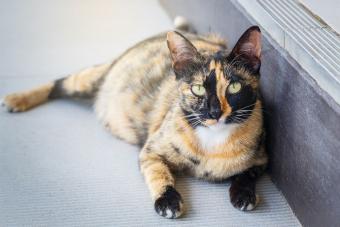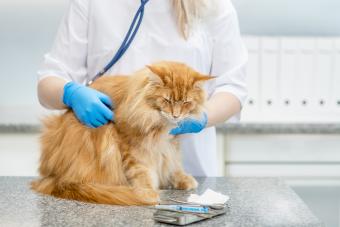Health Problems

While these tend to be robust and healthy cats, there are a few known Maine Coon health problems to watch out for if you own this breed. Know what to look for when it comes to everything from your kitty's heart to his hips.
Some blame the early breeding program for these common health concerns. However, most breeds have at least a few health issues. Knowing about the particular health issues that affect Maine Coons will help you choose a breeder with a cat less likely to develop these problems.
Enlargement of the Heart

Some have said that Maine Coons are susceptible to Hypertrophic Cardiomyopathy (HCM) or enlarged hearts, but the truth is that this disease affects many cat breeds. Careful breeding of healthy, hardy cats can help prevent this disease, but there are no warning signs to look for in telling if a cat will develop HCM.
Hip Dysplasia

There are some breeds that seem prone to hip dysplasia, and the Maine Coon is one of those breeds along with Devon Rex and Norwegian Forest Cat.
A cat with Hip Dysplasia may have trouble moving and seem to waddle when he walks or appear to have bowed legs. This condition is thought to be hereditary.
Polycystic Kidney Disease

Another in the lineup of health problems this breed may experience is Polycystic Kidney Disease (PKD). This is another disease that comes from genetics, so a kitten with PKD in his family tree may be more likely to develop the disease.
With PKD, cysts grow in the kidneys. This eventually causes an impairment in the functioning of the kidneys and leads to renal issues.
Spinal Muscular Atrophy

Another health problem known to be caused by a recessive gene and prevalent in these cats is Spinal Muscular Atrophy (SMA). Muscle weakness is one of the most common side effects of this disease. Most cats develop symptoms by about 12 to 16 weeks of age. SMA is not fatal, but it can severely impair a cat's mobility.
Gum Disease

Although this is a common problem in all cats, particularly older cats, many Maine Coons seem to have dental problems. Regular tooth brushing from the time the cat is a kitten, feeding a special diet and providing regular maintenance at the vet's can help prevent tooth and gum issues.
Sign up for our newsletter featuring all the latest stories and products we love.
Hairballs

Due to their thick coats, Maine Coon cats require regular grooming to keep loose fur at a minimum. A cat that is not brushed regularly can develop mats and will likely get more hairballs. To keep your pet's fur in optimal shape, brush or comb your pet three times a week.
Healthy Kittens

If you are thinking about purchasing a Maine Coon kitten or adopting a rescue pet, doing a little research on the breeder can help you avoid some of the common health issues known in this breed.
Reputable breeders will watch for sick cats in their breeding program and exclude them from the program to refrain from passing on any known genetic issues.







